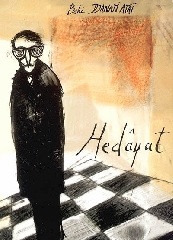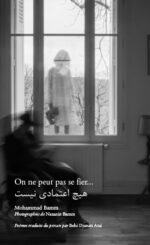After a first pass in France to carry out their studies in 1926, he returned to Paris in December 1950, where he lives 5 months prior to commit suicide at the age of 48, 9 April 1951.
For writing this play, Behi Djanati Ataï was based mainly on the facts reported by his father in the first biography of Sadegh Hedayat published in 1978, shortly before the Iranian revolution.
The play combines realistic universe of the last five months of Hedayat’s life, his encounters with a young Iranian student, lamp, and the fantastic world where the characters of his work come to life and intrudes in his moments of solitude.
 Listen
Listen Behi spends his tray Paris, is the support of the theater school of the street Blanche (ENSATT) where it is allowed, but according to the wishes of her mother, she decides not to become an actress in the short and began scientific studies . After a brilliant course, she began to attend a theater workshop in the evening and then spent a hearing that allows him to enter a troupe. Thus it becomes a professional actor. She plays in several contemporary works, and in 1998 created with Thierry Le Goff a theater on the White Whale barge in Paris. She also plays in feature films (including The elders who read novels of love, Rolph de Heer with Richard Dreyfus).
Behi remembers saw the injustice of censorship, by the fact that all the work done by his father, so to speak, "thrown in the trash with the work of Hedayat. It has long kept in her desire to write a piece from the book of his father and make him turn to tribute. As she wrote the piece for some time, she decided to only read the text after a trip to Iran. It was not returned to her country for 22 years, she discovers that Hedayat’s books but there are still censored and various books that refer to the biography of his father, although it is still prohibited. Upon her return, she realizes that 2003 will be the hundredth anniversary of the birth of Hedayat and the tenth anniversary of the death of his father. It therefore gives the text to the Director of Revest, the scene of Toulon, it already knows as an actress. The latter is captured by the project and its energy, it offers a home setting.

